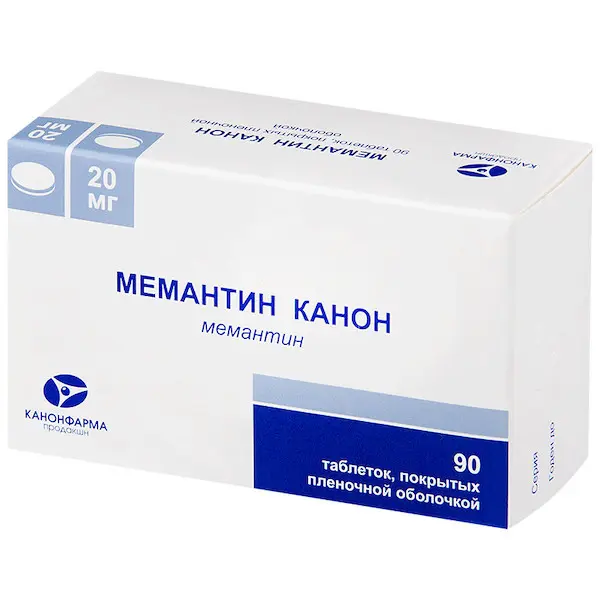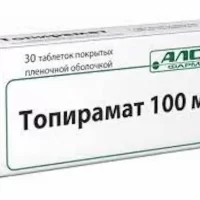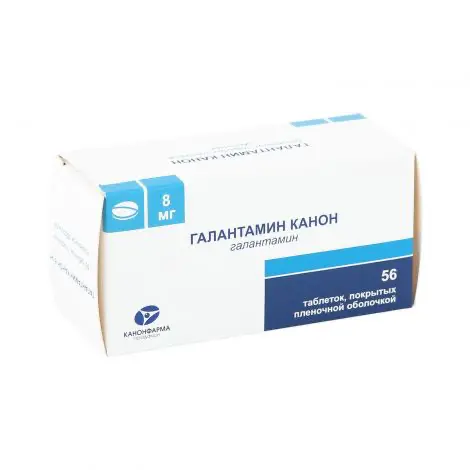Description
Memantine Pharmacodynamics
There is increasing evidence that disruption of glutamatergic neurotransmission, particularly of M-methyl-D-aspartate receptors (NMDA-receptors), contributes to both the symptoms and progression of neurodegenerative dementia.
Memantine is a potential-dependent noncompetitive blocker of NMDA receptors with moderate affinity for them. It modulates the effect of pathologically increased tonic glutamate, which can lead to neuronal dysfunction.
Indications
Treatment of moderate to severe Alzheimer’s disease.
Contraindications
– Hypersensitivity to any of the components that make up the drug;
– Severe hepatic insufficiency (class C according to the Child-Pugh classification);
– Pregnancy, breast-feeding;
– childhood under 18 years of age (efficacy and safety have not been established).
– Galactose intolerance, lactase deficiency, lactase deficiency.
With caution:
Epilepsy, history of seizures; history of myocardial infarction; heart failure (NYHA class III-IV); uncontrolled arterial hypertension; concomitant use of NMDA receptor antagonists (amantadine, ketamine, dextromethorphan); factors that increase urine pH (sudden change in diet (switch from meat to vegetarian diet), heavy intake of alkaline gastric buffers, renal tubular acidosis or severe urinary tract infections caused by Proteus spp. ); renal failure; hepatic failure (grade A and B according to the Child-Pugh classification).
Pregnancy and lactation:
Pregnancy .
No clinical data are available in pregnant women. Results from animal studies indicate that fetal intrauterine growth may be delayed at concentrations equivalent to or slightly higher than therapeutic concentrations. The potential risk to humans is unknown. Memantine should not be used in pregnancy unless clearly necessary.
Breastfeeding.
There are no data on penetration of memantine into breast milk, but given the lipophilicity of the substance, this cannot be ruled out. Women taking memantine should avoid breastfeeding.
Fertility
In preclinical studies of male and female fertility, no undesirable effects of memantine have been observed.
Dosage and administration regimen
- Dosing regimen
- Treatment should be carried out under the supervision of a physician experienced in the diagnosis and treatment of Alzheimer’s type dementia. Therapy should only be started if there is a caregiver who will regularly monitor the patient’s medication intake. The diagnosis should be made according to current guidelines.
- The adequacy of the dose and tolerability of memantine should be evaluated regularly, preferably within three months of starting therapy. Thereafter, the clinical benefit of the drug and patient tolerability should be evaluated according to current guidelines.
- Maintenance therapy should be continued as long as there is therapeutic benefit and satisfactory tolerability. If there is no longer a therapeutic benefit or intolerance of the drug, treatment should be discontinued.
- Adults
Dosage adjustment - Maximum daily dose is 20 mg. To reduce the risk of adverse reactions, the maintenance dose is achieved in 5 mg per week for the first three weeks according to the following scheme:
- Week 1 (days 1-7):
The recommended dose is 5 mg ( 1/2 tablet with a dosage of 10 mg) per day for 7 days. - Week 2 (days 8-14):
The recommended dose is 10 mg ( 1 10 mg dosage tablet) per day for 7 days. - Week 3 (days 15-21):
The recommended dose is 15 mg (1 1/2 10 mg dosage tablet) per day for 7 days. - Beginning week 4:
The recommended dose is 20 mg per day. - Maintenance dose
The recommended maintenance dose is 20 mg per day. - Elderly patients
Based on clinical data, the recommended dose for patients over 65 years of age is 20 mg per day as described above. - Patients with impaired renal function
In patients with mild renal dysfunction (creatinine clearance 50-80 ml/min) no dose change is required. In patients with moderate renal impairment (creatinine clearance 30-49 ml/min) the dose is 10 mg/day. If it is well tolerated for at least 7 days, it can be increased to 20 mg/day according to the standard scheme. In patients with severe renal impairment (creatinine clearance 5-29 ml/min) the dose is 10 mg/day. - Patients with impaired liver function
In patients with mild to moderate hepatic impairment (Child-Pugh grades A and B) a dose change is not required. There are no data on the use of memantine in patients with severe hepatic impairment. Memantine is not recommended for use in patients with severe hepatic impairment. - Children and adolescents
Due to lack of data on efficacy and safety, memantine is not recommended for children under 18 years of age. - Directions for use
Memantine is taken once a day, preferably at the same time every day. Film-coated tablets may be taken regardless of meals.





